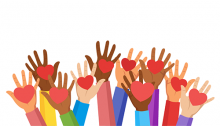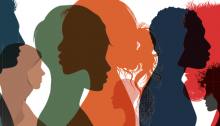Equity & Inclusion
Anti-oppressive social work is a frame we are striving to use in the Garland School to promote our work for racial equity, the voices of women, LGBTQ+ rights, and care for immigrants. Our approach to work for justice is informed by our Christian faith as well as our professional values and ethics.
At the intersection of faith and practice where the Garland School focuses much of our work, we hear the call to anti-oppressive social work reinforced. Christianity, as with the major world religions, seeks to challenge power inequities, center the lives of people who have been marginalized, and work for liberation for people who are oppressed. Our efforts to use the anti-oppressive framework are rooted in an intersectional approach that is race-focused first but also seeks to work for justice related to experiences of ethnicity, sex, gender identity, sexual orientation, class, and age. Intersectionality and anti-oppressive practices are increasingly at the core of our teaching and research in the Garland School.
A significant commitment in our work for racial equity is the dean’s appointment of a Race Equity Work Team, led by Kerri Fisher, with students, faculty, staff, alumni, Board of Advocate and campus representation, including Lori Baker and Malcolm Foley. This team has designed a strategy of four elements in the school where they seek to work alongside faculty and staff in creating change.
Here are some examples in our work of learning about and working toward racial justice:
The faculty of the Garland School have committed to studying the curriculum of Building Anti-Racist White Educators, a project of Melanated Educators Collective in Philadelphia and Teaching Tolerance. This year-long curriculum open to all social work faculty reminds us that antiracism is the work of people who benefit from white supremacy and not solely our BIPOC colleagues.
The faculty and staff have participated in several rounds of Eddie Moore, Jr.’s 21-Day Racial Equity Habit Building Challenge, and have invited colleagues from several other departments on campus to join us. The work includes a 21-day commitment to a daily practice of reading, listening, talking about, acting on, or other reflection related to power, privilege, supremacy, oppression, diversity, equity, and inclusion.
Faculty and staff are collaborating with Baylor Wellbeing to study LaTasha Morrison’s Be the Bridge curriculum. Based on a commitment to equity, racial healing, and conciliation, this group has two regular sessions with over 40 participants this fall.
In addition, our faculty and staff have participated in several sessions of the podcast study of Seeing White, a profound series from Scene on Radio that is excellently facilitated by Cuevas Peacock, from Baylor’s Office of External Relations.
Our school has had the support of several faculty who have been leading in the university’s efforts to develop a Baylor in the America’s Initiative. Luci Ramos Hoppe led the initial planning for this effort in partnership with the provost's office and Juan Carlos Esparza Ochoa joined the university as research faculty last year to further develop this work. This year, Flor Avellaneda joins as a postdoctoral fellow helping focus our research in this area and adding to the diversity of our teaching. As Baylor develops as an emerging Hispanic Serving Institution, we hope to learn what this means and contribute to this work in a meaningful way.
The Garland School has made clear its commitment to students and alumni that we are seeking to be a caring, Christian community for colleagues who identify as members of the LGBTQ+ community and have been misunderstood, maligned, and marginalized in our society. Our faculty and staff have work with LGBT students on campus for many years and seek to assure that each social work student is prepared to work with anyone they serve professionally in a non-discriminatory manner.









